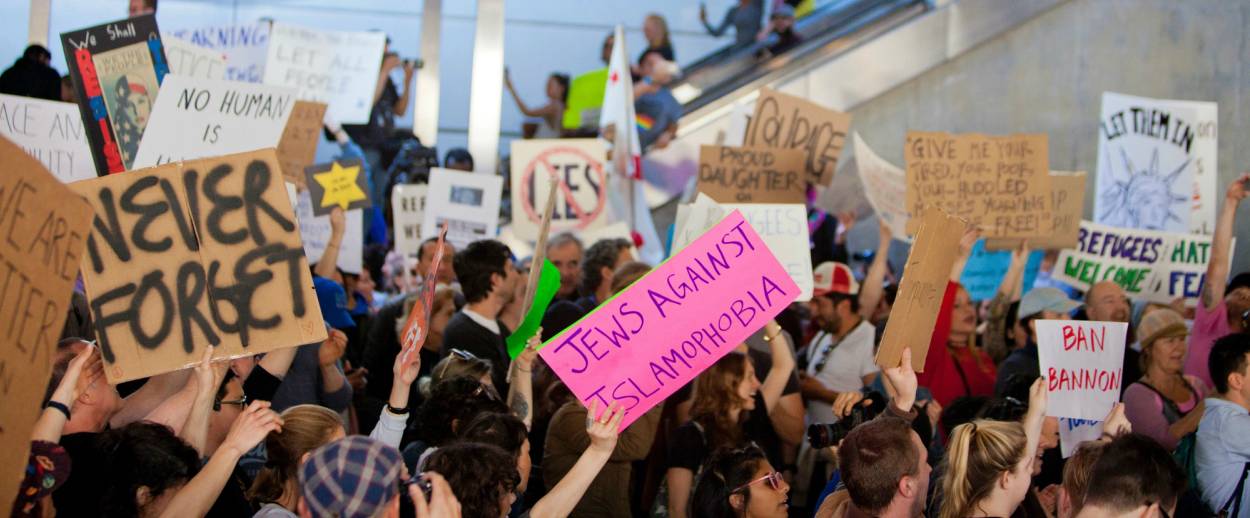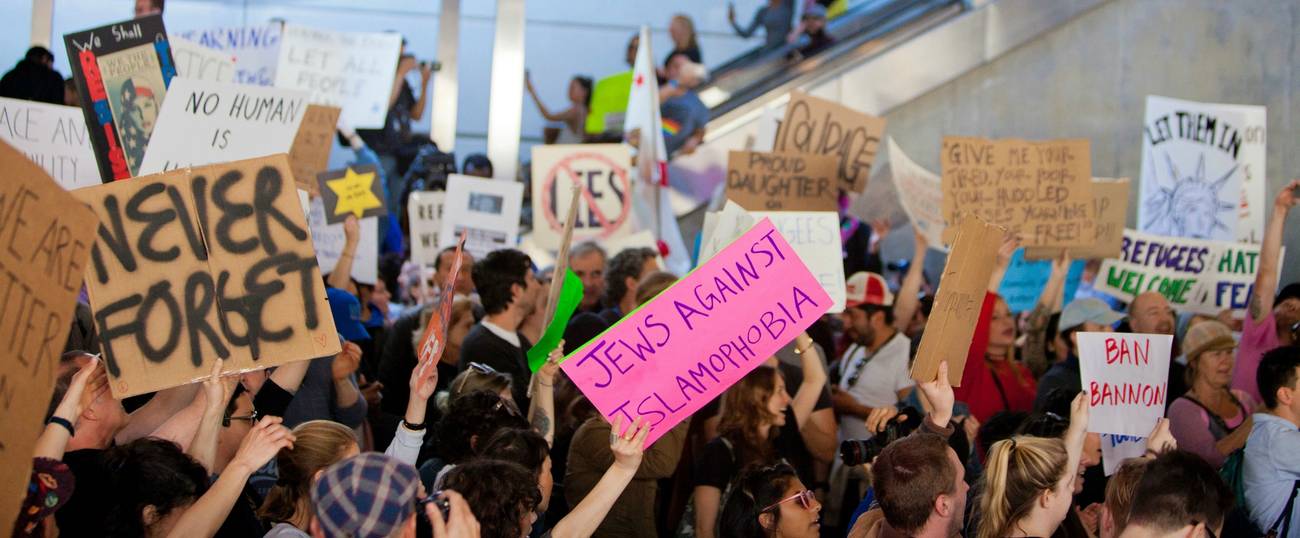Jewish Groups Across the Spectrum Unite in Condemnation of Trump’s Refugee Ban
From the Orthodox Union to the Reform Movement, and ‘Commentary’ to J Street, American Jews speak out in defense of refugees and Muslims




On Friday, President Donald Trump issued an executive order barring all immigrants and visa holders from entering the U.S. from seven Muslim-majority countries for 90 days. The order included green card holders and also banned all refugees for 120 days. Given the Jewish historical experience with being both refugees and subjected to religious loyalty tests, this directive unsurprisingly evoked a strong reaction from much of the American Jewish community. As so—contrary to some earlier claims—Jewish groups across the spectrum mobilized in opposition to the executive order, in a rare display of unity.
The American Jewish Committee was one of the first out of the gate, offering a detailed rebuttal to the policy:
“For more than 110 years, AJC has been a consistent voice for a fair, non-discriminatory, and generous U.S. refugee and immigration policy,” AJC CEO David Harris said. “We are all related to those fortunate enough to have been admitted to this country – in my case, my mother, father, wife, and daughters-in-law, and we believe that other deserving individuals merit the same opportunities to be considered for permanent entry.”
Assuring security in the implementation of immigration laws and procedures is essential, but lost in the current discussion over the suspension of refugee admissions and the issuance of all visas to citizens of seven Muslim-majority countries this week – as in the rhetoric of the presidential campaign – are several facts:
• Refugees from Syria, Iraq and other states in violent upheaval are already laboriously and intrusively vetted by U.S. immigration authorities, assisted by U.S. intelligence agencies, in cooperation with other nations’ intelligence services. For those approved, it generally takes 18 to 24 months to gain U.S. admission;
• Refugees from Central America are, almost exclusively, women and children who are at risk of violence, sexual assault, and even death if they are returned to their home countries. They deserve compassion and a fair hearing.
• The terrorist threat attributed to refugees is a cruel and distracting fiction, especially when viewed against the actual incidence of mass violence committed with chilling frequency – in schools, churches, shopping malls and other venues – against Americans by Americans. In the 14 years ending in October 2015, a period in which 784,000 refugees were resettled in the United States, there were exactly three arrests for planning terrorist activities (none of which occurred);
• Since the 1951 UN Refugee Convention, the United States and the international community as a whole have recognized an obligation to assist refugees. For America to close its eyes – and its borders – to even painstakingly vetted refugees contravenes that international treaty.
President Trump, of course, is authorized to assert the sovereign right of the U.S. to assure the integrity of America’s borders and the effective enforcement of the country’s immigration and asylum laws…
However, blanket suspensions of visas and refugee admission would suggest guilt by association – targeted primarily at Muslims fleeing violence and oppression. AJC regards such actions, contrary to international perceptions of a compassionate America and reinforcing anti-Muslim stereotypes, as both unjust and unwarranted.
As the full scope of the executive order became clearer in airports across the country, the AJC later told reporters, “We are outraged by the new US refugee policy, its draconian face. This is not the American way.”
The Anti-Defamation League was similarly scathing. “History will look back on this order as a sad moment in American History – the time when the president turned his back on people fleeing for their lives,” said ADL executive director Jonathan Greenblatt. “This will effectively shut America’s doors to the most vulnerable people in the world who seek refuge from unspeakable pain and suffering.”
“For the Sunni family whose son languishes in prison in Iran because of his faith, for the former Army translator in Iraq who has been threatened because of his service, LGBT youth in Yemen terrorized because of their sexual orientation or gender identity, for the widows and orphans caught between the barrel bombs of Assad’s regime and the unparalleled brutality of ISIS, this executive order could very well be a death sentence.”
The ADL vowed to “relentlessly … fight this policy in the weeks and months to come” because “our history and heritage compel us to take a stand.”
The Jewish Council for Public Affairs, which incorporates 15 national Jewish organizations from across the religious spectrum, as well as 125 local Jewish federations, spoke out as well. “We are deeply concerned about President Trump’s actions on immigration and refugees, and the callous decision to take such action on International Holocaust Remembrance Day,” said JCPA president and CEO David Bernstein. “These pronouncements not only severely restrict immigration, they instill fear among existing immigrant populations that they are not welcome and may be at risk.”
The JCPA added in a statement that
The Jewish people know firsthand the consequences of turning away those fleeing persecution. Based on our own immigrant experience and Judaism’s imperative to “welcome the stranger,” the Jewish Council for Public Affairs has advocated for more than 70 years on behalf of immigrants, refugees, and asylum-seekers who hope to build a better life for themselves and their children. Resettled refugees have consistently boosted the economy, and enriched our culture and pluralistic ethos.
The American Jewish World Service echoed these sentiments:
As a Jewish organization informed by the lessons of Jewish history and anchored by the value of respecting all people, we object in the strongest terms to the two unacceptable and inhumane policies on refugees and immigrants announced by the White House today,” said Robert Bank, President and CEO of AJWS. “We strenuously object to President Trump’s executive orders that would stop all refugees from entering the United States for 120 days and that would ban all individuals from Syria and suspend people from several other countries from seeking refuge in the United States,” added Bank. “These policies violate the best traditions of the United States, international human rights law and our deepest Jewish values.”
…“As the leader of an international Jewish organization that, for decades, has worked with Muslim organizations and Muslim partners to end poverty and advance human rights, we object in the strongest terms to the demonization of Muslims by the new American administration. We understand what it means for a community to be demonized by authoritarian powers, and we regret that President Trump does not understand this lesson from the darkest chapters in world history,” added Bank…
“We stand with refugees—those waiting desperately to gain protection within our borders and those who are here already and desperately hoping to be reunited with their family members who have yet to come to the United States. Denying refuge to those in need repudiates the Jewish mandate to welcome the stranger and is a gross affront to our shared humanity with all citizens of this world.”
The National Council of Jewish Women, which helped organized the Women’s March on Washington, added that “As Jews we are taught va’ahavtem et ha-ger — as we were once strangers, so must we love the stranger. We must rise above prejudice and fear to open our communities to the individuals and families who seek a haven in the United States.”
HIAS (formerly the Hebrew Immigrant Aid Society), which has helped resettled 4.5 million people—Jewish and not—since its inception in 1881, said that “To deprive refugees of safe haven is to scapegoat vulnerable human beings, and to confuse those who flee terror with terror itself. We can only pray that other countries do not follow Trump’s example of turning away people trying to flee genocide and persecution.”
All three major Jewish denominations also spoke out against the executive order. The Reform Movement, the largest of them, issued multiple condemnations through its various organs. “Yesterday’s executive order will be remembered with Dred Scott and WWII internment of Japanese Americans as government actions most antithetical to American values,” said Union for Reform Judaism president Rabbi Rick Jacobs, who tweeted for the first time to voice opposition to the refugee ban. A joint statement from the URJ, the Central Conference of American Rabbis, and the Religious Action Center declared: “We call on President Trump to rescind this abhorrent executive order. Every member of Congress must denounce its provisions, including the imposition of a religious test for entry, and urge its immediate repeal. Every American citizen must take every possible action to oppose this violation of America’s greatness.”
In a joint statement from its key institutions, the Conservative Movement emphasized that “our religious tradition repeatedly forbids us from oppressing the stranger,” adding that “it is a betrayal of Jewish history and our own Jewish values to stand quiet as victims of war and terror are left helpless — especially on the basis of religion.”
“Most importantly,” they continued, “the Conservative Movement completely rejects the targeting of individuals based on their religion. As Jews, it is an affront to our fundamental values. We are all enriched by the diverse set of experiences that immigrants bring to our society. We see it not only throughout our economy and educational system, but also in our synagogues, camps, schools, and institutions where people of diverse backgrounds, countries of origin and experiences come together to pray to the same God, who sees us all as equals. To do otherwise betrays the Jewish values we find deeply engrained in our faith and history.”
The statement was signed by the United Synagogue of Conservative Judaism, the Rabbinical Assembly, and the Jewish Theological Seminary, among others.
Finally, in a joint declaration, the Orthodox Union and the Rabbinical Council of America, the largest association of Orthodox rabbis in the country, reaffirmed their earlier concerns with Trump’s policy that they had first voiced when he proposed it during the Republican primary. “We call on all Americans to reaffirm that discrimination against any group based solely upon religion is wrong and anathema to the great traditions of religious and personal freedoms upon which this country was founded,” they said.
An array of liberal Jewish groups condemned the executive order, including T’ruah: The Rabbinic Call for Human Rights, and the liberal Zionist lobby J Street, which has recently been expanding its purview beyond Israel to broader leftist activism, and whose executive director Jeremy Ben Ami addressed Sunday’s protest in front of the White House.
On the other side of the aisle, Commentary Magazine, the flagship conservative Jewish publication, came out forcefully against Trump’s action. “The refugee executive order is not a policy based in fact,” wrote editor-in-chief John Podhoretz. “The facts do not support it. The facts since 9/11 do not offer the hint of a suggestion that refugees who have already gone through a vetting process pose a terrorist threat, either here or (as yet) in Europe. The most horrifying recent acts, the ones that triggered Trump’s initial announcement he wanted a total ban on Muslim travel to the United States, involve radicalized homegrown native-born citizen terrorists.” Likewise, conservative Washington Post columnist and Commentary alum Jennifer Rubin has been calling for Congress to overturn the ban, along with other prominent Jewish conservatives like The Weekly Standard‘s Bill Kristol and Wall Street Journal‘s Bret Stephens.
Notably, most of these individuals and groups condemned Trump’s refugee ban before condemning his administration’s Holocaust memorial statement that omitted Jews, if they addressed the latter at all.
Yair Rosenberg is a senior writer at Tablet. Subscribe to his newsletter, listen to his music, and follow him on Twitter and Facebook.